- Home
- Tahereh Mafi
Believe Me Page 2
Believe Me Read online
Page 2
“They didn’t know it was marked for demolition,” Ella says, a hint of impatience in her voice. “They made it into their studio precisely because no one was using it.”
“Yes,” Kenji says, pointing at her. “Right. But, see, I didn’t know that.”
“Winston and Alia are your friends,” I say unkindly. “Isn’t it your business to know things like that?”
“Listen, man, it’s been a really hectic two weeks since the world fell apart, okay? I’ve been busy.”
“We’ve all been busy.”
“Okay, enough,” Ella says, holding up a hand. She’s looking out the window, frowning. “Someone is coming.”
Kent.
“What’s Adam doing here?” Ella asks. She turns back to look at Kenji. “Did you know he was coming?”
If Kenji responds, I don’t hear him. I’m peering out of the very-tinted windows at the scene outside, watching Adam push his way through the crowd toward the car. He appears to be unarmed. He shouts something into the sea of people, but they won’t be quieted right away. A few more tries—and they settle down. Thousands of faces turn to stare at him.
I struggle to make out his words.
And then, slowly, he stands back as ten heavily armed men and women approach our car. Their bodies form a barricade between the vehicle and the entrance into the Sanctuary, and Kenji jumps out first, going invisible and leading the way. He projects his power to protect Ella, and I steal his stealth for myself. The three of us—our bodies invisible—move cautiously toward the entrance.
Only once we’re on the other side, safely within the boundaries of the Sanctuary, do I finally relax.
A little.
I glance back, the way I always do, at the crowd gathered just beyond the invisible barrier that protects our camp. Some days I just stand here and study their faces, searching for something. Anything. A threat still unknown, unnamed.
“Hey—awesome,” Winston says, his unexpected voice shaking me out of my reverie.
I turn to look at him, discovering him sweaty and out of breath.
“So glad you guys are back,” he says. “Do any of you happen to know anything about fixing pipes? We’ve got a kind of sewage problem in one of the tents, and it’s all hands on deck.”
Our return to reality is swift.
And humbling.
But Ella steps forward, already reaching for the—dear God, is it wet?—wrench in Winston’s hand, and I almost can’t believe it. I wrap an arm around her waist, tugging her back. “Please, love. Not today. Any other day, maybe. But not today.”
“What?” She glances back. “Why not? I’m really good with a wrench. Hey, by the way,” she says, turning to the others, “did you know that Ian is secretly good at woodworking?”
Winston laughs.
“It’s only been a secret to you, princess,” Kenji says.
She frowns. “Well, we were fixing one of the more savable buildings the other day, and he taught me how to use everything in his toolbox. I helped him build a wall,” she says, beaming.
“That’s a strange justification for spending the hours before your wedding digging feces out of a toilet.” Kent again. He’s laughing.
My brother.
So strange.
He saunters up to us, a happier, healthier version of him than I’ve ever seen before. He took a week to recover after we got him back here, but when he regained consciousness and we told him what happened—and assured him that James was safe—he fainted.
And didn’t wake up for another two days.
He’s become an entirely different person in the days since. Practically jubilant. Happy for everyone. A darkness still clings to all of us—will probably cling to all of us forever—
But Adam seems undeniably changed.
“Just a heads-up,” he says, “that we’re doing a new thing now. Nouria wants me to go out there and do a general deactivation before anyone enters or exits the grounds. Just as a precaution.” He looks at Ella. “Juliette, is that okay with you?”
Juliette.
So many things changed when we came home, and this was one of them. She took back her name. Reclaimed it. She said that by erasing Juliette from her life she feared she was giving the ghost of my father too much power over her. She realized she didn’t want to forget her years as Juliette—or to diminish the young woman she was, fighting against all odds to survive. Juliette Ferrars is who she was when she was made known to the world, and she wants it to remain that way.
I’m the only one allowed to call her Ella now.
It’s just for us. A tether to our shared history, a nod to our past, to the love I’ve always felt for her, no matter her name.
I watch her as she laughs with her friends, as she pulls a hammer free from Winston’s tool belt and pretends to hit Kenji with it—no doubt for something he deserves. Lily and Nazeera come out of nowhere, Lily carrying a small bundle of a dog she and Ian saved from an abandoned building nearby. Ella drops the hammer with a sudden cry and Adam jumps back in alarm. She takes the filthy beast into her arms, smothering it with kisses even as it barks at her with a wild ferocity. And then she turns to look at me, the animal still yipping in her ear, and I realize there are tears in her eyes. She is crying over a dog.
Juliette Ferrars, one of the most feared, most lauded heroes of our known world, is crying over a dog. Perhaps no one else would understand, but I know that this is the first time she’s ever held one. Without hesitation, without fear, without danger of causing an innocent creature any harm. For her, this is true joy.
To the world, she is formidable.
To me?
She is the world. So when she dumps the creature into my reluctant arms, I hold it steady, uncomplaining when the beast licks my face with the same tongue it used, no doubt, to clean its hindquarters. I remain steady, betraying nothing even when warm drool drips down my neck. I hold still as its grimy feet dig into my coat, nails catching at the wool. I am so still, in fact, that eventually the creature quiets, its anxious limbs settling against my chest. It whines as it stares at me, whines until I finally lift a hand, drag it over its head.
When I hear her laugh, I am happy.
THREE
“Warner?”
“Mr. Warner?”
The invocation of my name in stereo nearly startles me; I absorb this surprise with practiced calm, carefully releasing the dog to the ground. I begin to turn in the direction of the familiar voices, but the liberated creature decides to do nothing with its freedom, instead lifting a paw to my trousers as it whines, yet again, its upturned face imploring me to do something.
Feed it? Pet it?
It barks then, and I spare it a single sharp look, after which it quiets, eyes cast down as its mangy body slumps to the ground, head resting on its paws. The dog settles so close to me its little black snout bumps my boot. I sigh.
“Mr. Warner?” Castle, again.
He and his daughter, Nouria, are staring at me, the latter breaking eye contact only to shoot her father a nearly imperceptible look of frustration.
I glance between them. Clearly, the two still haven’t fully settled the specifics of their roles around here.
“Yes?” I say, even as a feeling of unease blooms in my chest.
Castle and Nouria have come to collect me for a private conversation; I can sense this right away. That my mind reaches for anger in response is irrational—I understand this even as it happens—for they cannot know the fear I experience when I leave Ella behind. I have a sudden need to search for her eyes then, to reach for her hand, and I crush the impulse even as my heart rate climbs, a symptom of the new panic lately born in my body. These reactions began shortly after we returned to the Sanctuary; when, to the soundtrack of horrified screams, Ella’s limp figure was carted off the plane and planted in the medical tent, where she lived and slept for ten of the fourteen days we’ve been back. It has been, in a word—difficult. And now, whenever I can’t see her, my brain tries to convi
nce me she’s dead.
Castle says, “Could we steal you for a brief window? Something urgent has come up, and w—”
Nouria presses pause on this statement with a gentle touch to her father’s forearm. Her smile is forced.
“I’ll need only a few minutes of your time,” she says, glancing briefly at someone—Ella, probably—before meeting my eyes again. “I promise it won’t take long.”
I want to say no.
Instead, I say, “Of course,” and finally compel myself to look at Ella, whose steady gaze I have been avoiding. I smile at her as my brain attempts to override its own instincts, to do the calculus necessary to prove my fears a manifestation of an imaginary threat. Every day that Ella remains alive and well is a victory, a concrete set of numbers to add to a column, all of which make it easier for me to do this math; I’m able to process the panic a bit faster now than I did those first few nights. Still—despite my efforts to keep this from her—I have felt Ella watch me. Worry.
Even now, my smile has not convinced her.
She scrutinizes my eyes as she presses a bouquet of newly acquired tools—screwdrivers?—into Kenji’s arms. She walks over to me and promptly takes my hand and I’m dealt the blow of an emotional eye roll from our audience. It is a miracle, then, that Ella’s love is louder; and I’m so grateful for the reassurance of her touch it pierces me through the chest.
“What’s going on?” she says to Nouria. “Maybe I can help.”
I catch a note of worry from Nouria then, and, impressive: it never touches her features. She grins when she says, “I think you have enough to do today. Warner and I just have some things we need to discuss. Privately.”
She says this last bit in a teasing way, the implication that our discussion might have something to do with the wedding. I stare intently at Nouria, who will not now meet my eyes.
Ella squeezes my hand and I turn to face her.
You okay? she seems to say.
She’s done this a lot lately, speaking to me with her thoughts, her emotions.
For a moment, I can only stare at her. A riot of feeling seems to have fused inside me, fear and joy and love and terror now indistinguishable from one another. I lean down, kiss her gently on the cheek. Her skin is so soft I’m tempted to linger, even as the emotional disgust of our audience ratchets only higher.
I’ve been afraid to touch her lately.
In fact, I’ve done little more than hold her since we fled Oceania. She nearly died on the flight home. She was already weak when we found Emmaline, having spent most of her energy fighting to kill the poisonous program overriding her mind; worse, she’d torn the tech free from her arm, leaving behind a gaping, gruesome wound. She was still bleeding from her ears, her nose, her eyes, and her teeth when she tore through Max’s light, stripping the flesh from her fingers in the process. She was so drained by this point that even with Evie’s reinforcements her body was failing. She landed badly and snapped her femur when she fell loose from Max’s holding chamber, and then used what little strength she had left to first kill her own sister and then set fire to the capital of Oceania.
When the adrenaline wore off and I saw, for the first time, the edge of severed bone jutting through her pant leg—
The memory is not worth describing.
The next several hours were grim; we had no healers on the flight home, no sufficient pain medication, nothing more than a basic first aid kit. Ella had lost so much blood—and was in such excruciating pain—that she soon fell unconscious. I had no doubt she would die before we touched ground. That she survived that horrific plane ride was its own miracle.
When we finally arrived on base Sonya and Sara did everything they could to help Ella, but they made no promises; even as Ella’s physical injuries healed, she was unresponsive. She was incapable of even opening her eyes.
For days, I wasn’t sure she would make it.
“Aaron—”
“Secrets,” I whisper, forcing myself to draw away. “Nothing to worry about.”
She studies my eyes. I feel her quietly wage war, happiness and doubt fighting for dominance.
“Good secrets?” she asks hopefully.
My heart lurches at the softness in her voice, the smile that lights up her eyes. I never cease wondering at how skillfully she compartmentalizes her emotions, even in the wake of so much brutality.
Ella is strong where I have forever been weak.
I lost faith in people—in the world—long ago. But no matter how much bloodshed and darkness she experiences, Ella never seems to lose hope in humanity. She is always striving to build a better future. She is always gentle and kind with those she loves.
It is still so strange to me that I am one of those people.
I feel the hum of Castle and Nouria’s increasing impatience, and my resentment grows only larger; I generate a fresh smile for Ella and walk away as I do, having left her question unanswered. I don’t know what Nouria needs from me, but I fear her news is bleak; no doubt Ella’s life is at risk in some new way we’d not anticipated.
The thought alone fills me with dread.
Unbidden, I feel my hands tremble; I shove them in my pockets as I go. The hesitant bark of a mangy dog is soon followed by the sound of its paws tapping the ground, the little beast picking up speed as it hurries to keep pace with me. Briefly, I close my eyes.
This place is a zoo.
Even as I recognize the importance of our work, there remains a regrettably large portion of my mind that finds everyone here detestable—everything here detestable.
I am tired.
I want nothing more than to escape this noise with Ella. I want, above all else, for her to be safe. I want people to stop trying to kill her. I want, for the first time in my life, to live in peace, undisturbed; I want to be required by no one but my wife.
These, I realize, are unattainable fantasies.
Castle and Nouria both nod at me as I approach, indicating that I should follow their lead as they turn down the path. I already know they’re headed to Nouria and Sam’s office—affectionately labeled the war room—where we’ve had many similar meetings.
I glance back just once, hoping to catch a final glimpse of Ella’s face, and instead home in on Kenji, whose thoughts are so loud they’re impossible to ignore. I experience a flash of anger; I know he’s going to follow me even before he moves in my direction.
Between him and the dog trailing me, I’d choose the dog.
Still, both creatures are on my heels now, and I hear Adam laugh as he says something unintelligible to Winston, the two of them no doubt enjoying the spectacle that is my life.
“What?” I say sharply.
The approaching shadow soon evolves into flesh beside me, Kenji matching my strides down the overgrown path, our boots crushing aggressive weeds underfoot. Figures dot the periphery of my vision, their feelings assaulting me as I go. Some of them still think I’m some kind of hero, and are consumed as a result by an idiotic devotion to a warped perception of my identity. My face. My body.
I find these interactions suffocating. Just now, Kenji’s anger toward me is so audible I feel it giving me a headache. Still—better anger, I think, than grief.
The collective grief of a crowd is nearly unbearable.
“You know, I really thought you’d be less of an asshole once we got J home,” he says flatly. “I see nothing has changed. I see all the efforts I made to defend your shitty behavior were for nothing.”
The dog barks. I hear it panting.
It barks again.
“So you’re just going to ignore me?” Kenji exhales, irritated. “Why? Why are you like this? Why are you always such a dick?”
Sometimes I’m so desperate for quiet I think I might commit murder for a moment of silence. Instead, I shut down incrementally, tuning out as many voices as I’m able. It wasn’t so bad before I was forced to join this peace cult. In my previous life at Sector 45 I was left alone. At Omega Point, I spent most of my
time in solitary confinement. When we later took over 45, I retained the privacy of my rooms.
Here, I am losing my mind.
I am bombarded, en masse, by the emotional downloads of others. There is no reprieve from the pandemonium. Ella likes spending time with these people, and these people do everything in crowds. Meals are taken in a massive dining tent. End-of-day mingling is done communally, in the quiet tent, where it is never quiet. Many of the cabins were damaged or destroyed in the battle, which means everyone is currently sharing space—or sleeping in common areas—while we rebuild. Nouria and Sam did us a kindness by repurposing Ella’s room in the medical tent; it seemed the only alternative to bunking with everyone else in a makeshift barracks. Still, our room smells always of antiseptic and death. There is only one narrow hospital bed, over which Ella and I argue each night. She insists, despite my unassailable protests, that I take the bed while she sleeps on the floor.
It’s the only time I ever get upset with her.
I don’t mind the cold floor. I don’t mind physical discomfort. No, what I hate is lying awake every night listening to the pain and grief of others still recovering. I hate being reminded constantly of the ten days I spent standing in the corner of our room watching Ella struggle to come back to life.
My need for silence has grown debilitating. Sometimes I think if I could kill this part of me, I would.
“Don’t touch me,” I say suddenly, sensing Kenji’s intention to make contact with me—to tap my shoulder or grab my arm—before it happens. It takes a great deal of self-control not to physically respond.
“Why do you have to say it like that?” he says, wounded. “Why do you make it sound like I was going to enjoy touching you? I’m just trying to get your attention.”

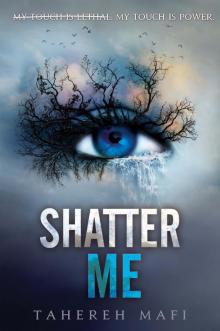 Shatter Me
Shatter Me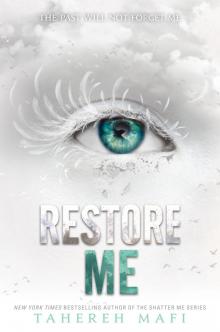 Restore Me
Restore Me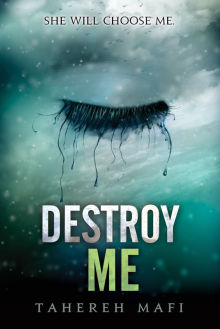 Destroy Me
Destroy Me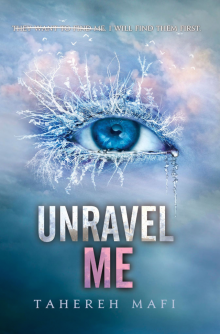 Unravel Me
Unravel Me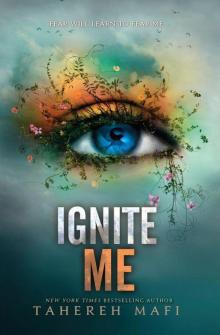 Ignite Me
Ignite Me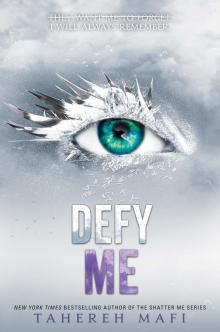 Defy Me
Defy Me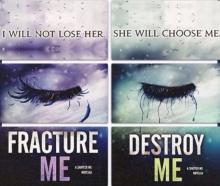 Fracture Me
Fracture Me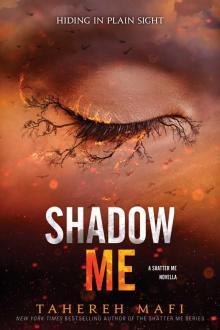 Shadow Me
Shadow Me Whichwood
Whichwood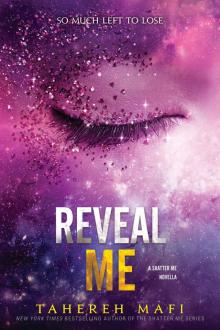 Reveal Me
Reveal Me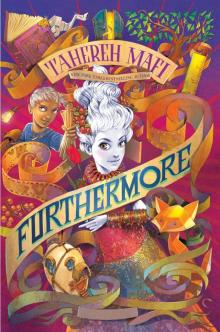 Furthermore
Furthermore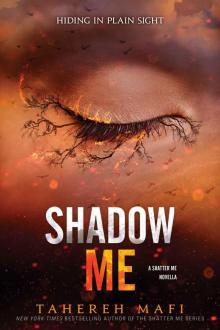 Shadow Me (Shatter Me Novella)
Shadow Me (Shatter Me Novella)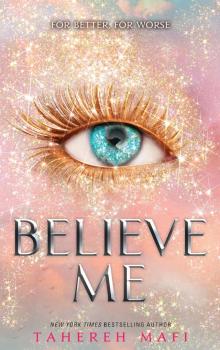 Believe Me
Believe Me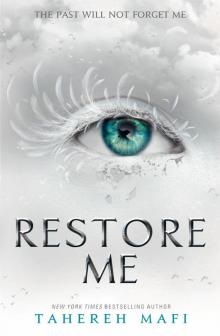 Restore Me (Shatter Me)
Restore Me (Shatter Me)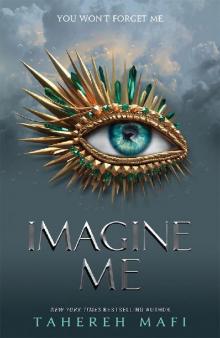 Imagine Me
Imagine Me An Emotion of Great Delight
An Emotion of Great Delight Find Me
Find Me A Very Large Expanse of Sea
A Very Large Expanse of Sea Unravel Me: The Juliette Chronicles Book 2
Unravel Me: The Juliette Chronicles Book 2